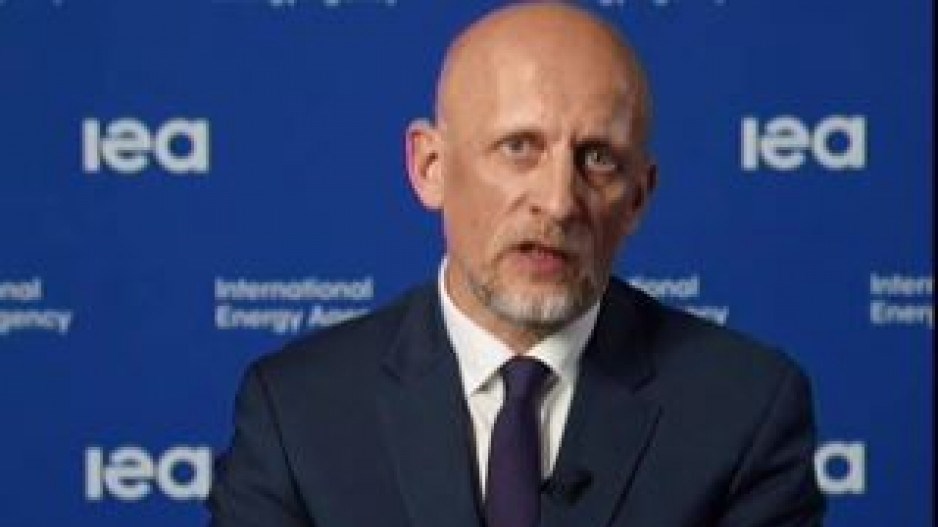Now that the road to net zero has been bombed by Russia, there may be a slight detour. But the current energy crisis gripping the western world – a crisis exacerbated by war -- presents both challenges and opportunities for the energy transition, those attending a GLOBE Forum session on a fair energy transition heard Tuesday.
“Russia’s invasion of Ukraine has reminded us that the path to net zero is not necessarily going to be a smooth or an easy one,” Tim Gould, chief energy economist for the International Energy Agency (IEA), said during a discussion on a fair energy transition. “But it also has reminded us why that journey is so necessary.”
The Paris-based IEA was actually created in response to an oil crisis. Conflict in and with the Middle East led to oil embargoes in the 1970s, leading to gasoline rationing in the U.S., high inflation and, ultimately, a deep recession.
The IEA was developed to provide statistics, information, research and policy guidance on global oil and energy markets. In recent years, it has provided guidance for governments and agencies developing strategies for getting off of fossil fuels.
The oil crisis of the 1970s underscored America’s lack of energy security, and led to “a surge of innovation," Gould said.
The U.S. invested in nascent solar power technology, and innovations in oil sands technology in Canada and hydraulic fracturing and horizontal drilling in the U.S. led to the shale gas boom. Both of these innovations resulted in the U.S. and Canada becoming more energy self-sufficient, and more insulated from the kind of shocks Europe is experiencing right now.
“The difference now is that we are seeing the world’s first great energy shock,” Gould said. “Because today it’s not just about oil. We’re also seeing shocks for natural gas and, largely because of natural gas, also for electricity prices in many countries as well.”
Gould said the current energy crisis could likewise accelerate another energy innovation boom.
“We believe that we could be seeing something similar happening over the next few years, but this time not just in response to energy security worries, but to make sure that we tackle the climate challenge as well.”
But some of the innovations needed may need to be in materials substitution, as it is becoming increasingly apparent that commodities like lithium, cobalt, and nickel simply won’t be available in sufficient supply for all the electric cars, batteries and renewable energy that will be needed.
Those commodities are already in a bull market that some analyts believe is just the beginning of a long critical metals supercyle.
“Now we have copper, lithium, cobalt, nickel, aluminum – all the inputs to a lot of the renewable energy transition – go through the roof,” said panelist Peter Tertzakian, deputy director for Canada's ARC Energy Research Institute.
“How do we deal with a situation where we seem to be boxed in right at the resource level?” Tertzakian wondered.
To that question, there seems to be no easy answer. The reality is that it takes too long to build new mines to meet demand along the kind of timelines governments and agencies have set for themselves in the race to dramatically reduce greenhouse gas emissions by 2030 and reduce them to zero by 2050.
“Canada is, of course, very resource rich,” Tertzakian said. “It’s got all of the metals and minerals that we talked about before – copper, nickel and zinc, etcetera -- that is needed. But the reality is that it takes years to develop the supply chains and mines and things.”
Gould conceded that, in the short-term, fossil fuels may continue to dominate the world's primary energy.
“Immediately, I think there would be, undoubtedly, a reliance in some places on more emissions-intensive fuels even,” he said. “But I do think that this is a potential accelerant towards a longer journey to a net zero economy.
“High fuel prices are of course a burden, but they are also an opportunity to have some conversations about quite fundamental aspects of the way that we live.”
Tertzakian noted that for North Americans, high gasoline prices are “unpleasant,” whereas in Europe energy prices are “acute.”
“We’re talking prices to heat homes and do things going up multiples,” he said.
He wondered if social unrest might stymie transition efforts, as citizens begin to push back against high energy prices.
“You can paint pictures where a disenfranchised populace, as a consequence of fiscal inequality – in other words inability to pay the bills – leads to policies that ultimately take us backwards,” Tertzakian said.
Ultimately, Gould said, investments in alternative energy sources can actually reduce costs for consumers. More energy efficient homes and cars that run on electricity instead of gasoline could ultimately cost people less.
“That’s clearly a big worry for many policymakers around the world,” Gould said. “And I don’t think we can just talk about Europe as well. The regressive nature of high fuel prices are particularly affecting vulnerable fuel import-dependent countries around the world that are a very much earlier stage in their development.
“Our message to governments, in that respect, is that many of the technologies -- many of the investments that are helping to deal with the climate crisis -- also provide a measure of insulation against the impacts of high or volatile commodity prices.
“There is a very strong case from that perspective, as well, to double down on some of the changes that are required. But we are very well aware that energy transitions… involve a move to capital intensive technologies that have much lower operating costs, so you need to find a way to bear those upfront costs.
“That’s where I think there’s an extremely important role for governments to help communities – particularly vulnerable communities – to make that move into the new energy economy.”




